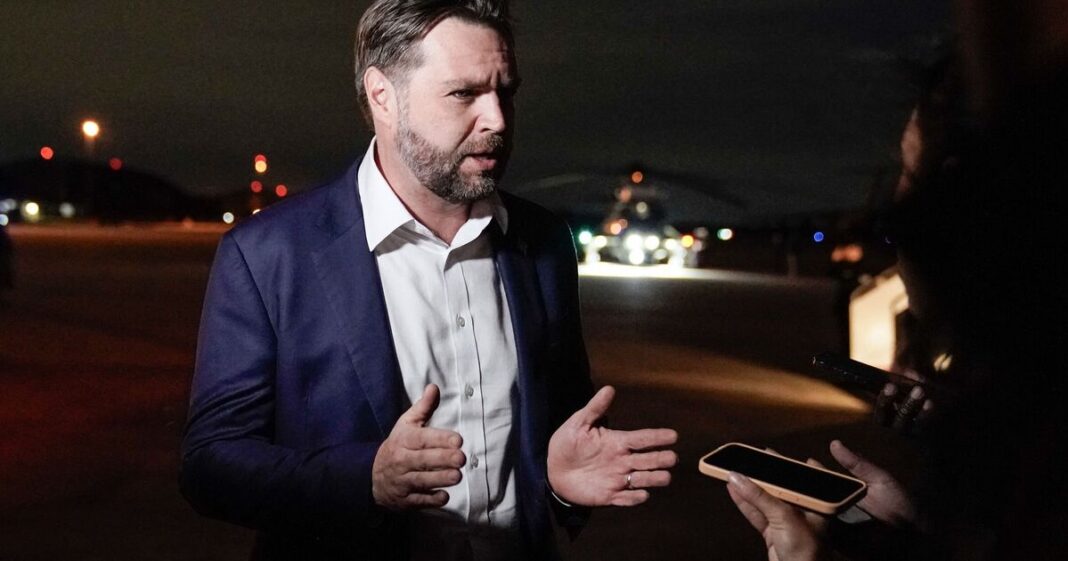Vice President JD Vance’s Blunt Remarks on Narcoterrorism
In a recent statement, Vice President JD Vance made headlines when he expressed indifference towards the fate of two alleged narcoterrorists repatriated following a U.S. military operation. During a press briefing, he said, “What happens to them? I don’t really care, so long as they’re not bringing poison into our country.” This remark underscores the administration’s assertive stance on combating drug trafficking and narco-terrorism.
The U.S. Military Strike
The U.S. military conducted an operation on a “very large drug-carrying submarine” navigating toward American shores, as confirmed by President Donald Trump. The strike, which took place on a Thursday in late September, resulted in the deaths of two individuals onboard and the rescue of two others. These surviving suspects, identified by Trump as “narcoterrorists,” are being sent to their home countries—Ecuador and Colombia—for detention and potential prosecution.
Escalating Drug War Rhetoric
This strike marks the sixth in a series of military actions in the Caribbean region in September alone. The escalation of these operations coincides with mounting concerns over a potential political upheaval in Venezuela, suggesting a broader strategy that integrates national security with foreign relations. The Pentagon has since confirmed yet another strike, further amplifying the dialogue surrounding the drug war within the administration.
Vance’s Perspective on Prosecution
When questioned about the rationale for returning the surviving suspects to their countries rather than prosecuting them in the U.S., Vice President Vance remained steadfast in his position. He emphasized the administration’s primary objective: to annihilate drug shipments before they can reach American communities. Vance reiterated that the decision-making process regarding the fate of these individuals is managed on a case-by-case basis, dependent on specific circumstances surrounding each operation.
The Stakes Involved
During the press conference, Trump claimed that the single strike had potentially saved “at least 25,000” lives. Vance echoed this sentiment, stating that dismantling drug networks directly contributes to protecting American lives. He elaborated on how specific combatants involved in these operations are evaluated, comparing the situation to other global conflicts where the treatment of apprehended individuals varies based on context.
A Focus on Narco Terrorism
According to Vance, the categorization of these individuals as “narco terrorists” is crucial for understanding the threat they pose. He noted that individuals engaging in such criminal activities are intent on inflicting harm through the distribution of dangerous substances. Vance stressed that the administration is committed to eradicating these threats with a strong focus on collaborative international efforts and coordination with ally nations.
The Case-by-Case Approach
Vance further clarified that the decisions made after military strikes are contingent upon many factors, including the nature of the operation and the individuals involved. He pointed out that sometimes it may be appropriate to involve foreign judicial systems, while at other times, the U.S. might assume responsibility. He reiterated that the ultimate goal remains consistent: “These are narco terrorists who are trying to bring poison into our country and kill our citizens.”
Final Remarks
The vice president’s remarks reflect a broader commitment from the administration to combat drug trafficking and related violence. His indifference towards the repatriation of the surviving suspects reveals a tactical focus on the bigger picture—protecting American lives from the harms posed by the narcotics trade. The administration appears to be preparing for a sustained campaign against drug cartels, weighing various approaches to ensure that justice is served, even as accusations and interventions draw attention to the complexities of international law and diplomacy.



